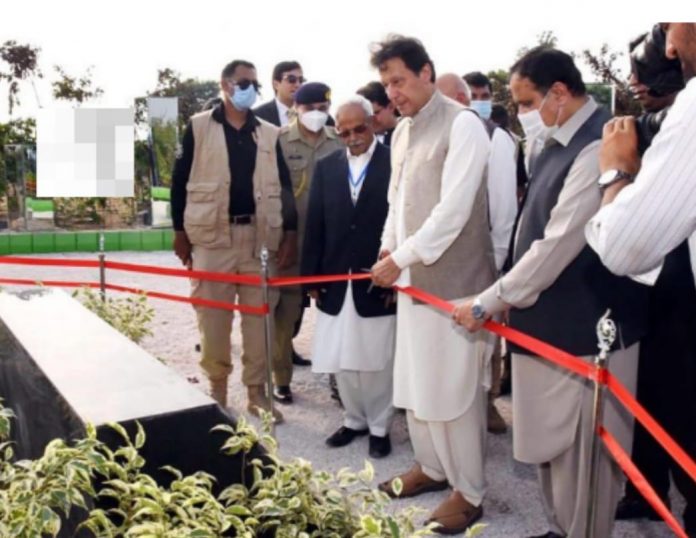LAHORE, Though Covid-19 pandemic has endangered global economy and disrupted billions of lives around the world, however, Pakistan stays among the blessed countries due to well-thought-out policies and timely corrective measures of the government, particularly in the construction and industrial sectors.
The ambitious Central Business District (CBD) project at the Walton Airport site and the first phase of modern Allama Iqbal Industrial City (AIIC) under the China-Pakistan Economic Corridor (CPEC) are part of the revolutionary initiatives taken by the Pakistan Tehreek-e-Insaf government to minimize the effects of the pandemic.
However, it would be hard to fully comprehend the importance of these initiatives without having a brief look at the world economies in the backdrop of the Covid-19
pandemic.
The novel coronavirus outbreak last year caused a historic recession with record levels of deprivation and unemployment, creating an unprecedented human crisis, which hit the poor of the poorest hard.
To steer countries out of the situation, experts suggested that inclusive and sustained economic growth was the only solution which could drive progress, create sufficient jobs for all and improve living standard of the common man. The International Monetary Fund (IMF) recently showed its concerns over an expected global recession much worse than the one in 2009.
The International Labour Organization (ILO) has also estimated that job losses around the world, both in developed and underdeveloped countries were increasing and nearly half of the global industrial labour workforce was at the risk of losing their livelihoods.
Similarly, the United Nations Secretary-General has also stressed that the recovery from the Covid-19 crisis was a must for every country to lead to a different economy.
In this scenario, experts believed that beyond the immediate crisis response, the prevailing pandemic should be the impetus to sustain the gains and accelerate implementation of long-overdue measures to put the world on a modern and more sustainable development path to make the global-economy more resilient to future miseries and shocks.
Even before the outbreak of the pandemic in 2019, one in five countries millions of people were living in poverty who had further witnessed a decline in per capita income during the year 2020.
Besides disruptions of industrial production, the world is also being faced with severe economic and financial shocks, which are directly associated with Covid-19 pandemic. Fall in commodities’ prices, rise in insecurity and financial market volatility are the factors which had derailed the already tepid economic growth and compounding risks associated with some other harming factors.
The developed countries are bringing a change in money generation designs and patterns. They are turning their modern cities into magnets for talent and investment and have become the world’s major growth engines by generating around 80 per cent of the global gross domestic product (GDP).
The economic and social opportunities in mega cities are helping hundreds of millions of privileged segments to lift themselves out of extreme poverty. However, on the other hand, the thickly populated cities in Pakistan like Lahore and Karachi, developed without any planning, are facing tremendous challenges in terms of worsening situation of widening income gaps among their populations.
However, the political leadership of the country led by Prime Minister Imran Khan has saved the national economy and revived it through different mega projects. Development plans of the urban economy were also taken up at the highest level for the first time in history of the country.
Keeping in view the revitalization of the economy of mega city Lahore, Prime Minister Imran Khan has announced the Central Business District (CBD) project in February this year at the Walton Airport site.
The premier has asserted that the CBD project would help generate income opportunities which would be spent on building up of the neglected sectors. An economic hub would be created by constructing high-rise industrial buildings along the Ferozepur Road and Gulberg Main Boulevard, the CBD official sources told APP.
The project is likely to generate around Rs 1,300 billion, which would offer some
Rs 250 billion to the federal government in the tax-revenue, the sources said.
They added that the Lahore Central Business District would be completed in three phases over an area of 300 acres in which the first phase would be followed by a digital and a residential district in the second and third phase.
Meanwhile, the Punjab’s first Special Economic Zone (SEZ), built under the
China-Pakistan Economic Corridor (CPEC), a segment of the first phase of modern Allama Iqbal Industrial City (AIIC), has also been completed with a cost of Rs 7.5 billion.
The rest part of work on the AIIC project was being carried out at a fast pace. The project sprawling over 3,300 acres of land, featured an apparel park, furniture city, modern business centre and the largest expo centre to display ‘Made-in-Pakistan’ products to attract local and foreign investor and buyers, Faisalabad Industrial Estate Development and Management Company (FIEDMC) Chairman Mian Kashif Ashfaq told APP.
Around 20 industrial units had started their production, which had been constructed on one-third of the land of first phase of Allama Iqbal Industrial City, while remaining would go into operation by the end of this year, Ashfaq added.
Prime Minister Imran Khan expressed his gratitude over the pace of work on the project and directed the authorities concerned to expedite the work on industrial plots’ allotment to foreign and local investors by facilitating them through one-window operation.
The government was fully committed to providing the best possible package of incentives to foreign and local investors to boost industrial production and strengthen the national economy, Kashif Ashfaq said.
He added that Pakistan Tehreek e Insaaf government had already given approval of 500-megawatt grid station and 40mmcf gas provision to meet the demand of these industrial units.
The Punjab Provincial Development Working Party (PDWP) has also recently approved five development schemes in various sectors with an estimated cost of Rs 9,149.376 million. These schemes were approved in the third meeting of the PDWP of the current fiscal year 2021-22, a PDWP document revealed.
Follow the PNI Facebook page for the latest news and updates.









